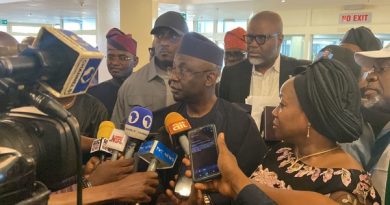Book Review: STEPPING ON TOES My Odyssey at the Nigerian Ports Authority by Hadiza Bala Usman
Ms. Hadiza Bala Usman is the author of Stepping On Toes. She is the first female to head the Nigerian Ports Authority as well as the first female Chief of Staff(CoS) in northern Nigeria to the Kaduna State Governor, Mallam Nasir el-Rufai in 2015.
The book size and cover design is attractive and vividly captures the essence of the title “Stepping On Toes”. The 143 page book has 17 chapters choreographically sequenced to link the next chapter.
The book is clear from the beginning about the authors reason for engaging in the endeavor. One of the critical reason for writing the book according to her intro is to ‘repudiate lies and explain misconceptions and half truth’. This is not unexpected given the barrage of criticism that characterized her tenure as MD of NPA. The narrative of non-remittance of operating surpluses by NPA to the Consolidated Revenue Fund which eventually led to her suspension support this position. The other rationale as contained in the book is her stewardship in NPA. “This book recounts the modest efforts we made to turn things around in NPA”. The updated backlog of unaudited financial statements of NPA from 2013 to 2016 as well as up-to-date audited accounts till 2019 among others mentioned in chapter 5, is one of her achievement recorded in the book.
Also, the decongestion of traffic at Apapa port regarded as a recurring decimal caused by cargoes carrying dry and liquid bulks is another of her landmark effort as stated in the sixth chapter of the book. Fixing the link road and laying rail tracks to the port, developing e-call up app for trucks as well as truck parks in some locations are mentioned in the book as some of the signature projects achieved during her tenure as MD of NPA.
My perception of the author from the book reveals a person that is focused, audacious, subtly ambitious, a team player and knowing the spot to anchor and maintain loyalty. An account for instance where she boldly confirmed to Alhaji Ismaila Isa Funtua, an elder statesman now late and whom she said was a friend of her father… “that she indeed said that’, responding to his cue ” Oh Hadiza, I understand that you said I had no right to question your appointment. I believe you didn’t say that”, speaks of her guts.
The authors capacity, work ethic and ability to work well with people to earn target result is seen in the generous number of persons listed in her acknowledgement as impacting her career in NPA. In addition, her attestation in chapter 2 ‘I believe Hon. Amaechi was motivated to engage me in one of the agencies under his ministry from his observance of my work ethic’, and continuing which torch her loyalty trait ‘… and absolute loyalty to persons and causes to which I commit. For the same reason, I imagine Mallam el-Rufai… appointed me… in 2015’. pages 23,24.
Hadiza evoked a strong bond with her late father Dr. Yusuf Bala Usman whom she not only dedicated the book but doubled down on the values he held dear which is a good name and resonates as well with her. The quote ‘So, I wrote this book as a token of the spirit to always render account with which I was raised’ buttresses her tie with family.
The first chapter captured her conversation with Hon. Rotimi Amaechi over her appointment as Managing Director of the Nigerian Ports Authority and the dilemma of dropping her nascent appointment as Chief of Staff to el-Rufai. Chapter two though titled Prelude to 2015 general elections, established her working relationship with Amaechi, then DG, Muhammadu Buhari/Yemi Osinbajo Presidential Campaign Organisation where she recounted working with him by default in Port Harcourt, acting as administrative assistant in the secretariat of the Presidential Campaign Council and on Buhari winning the March 2015 general elections, she was appointed a member of the Presidential Inauguration Committee.
The author opened the flood gate of actually stepping on toes from chapter 4 which is dedicated to Sageto, a construction company hired to build a facility in the premises of the Authority’s headquarter in Lagos. The company linked to a former top government official which had weigh exceeded the period of contract delivery, was given an ultimatum to complete the project already bankrolled by the previous management and exit the premises of the Authority. This stern action was not without external resistance from highly connected individuals and groups but she was determined to right the wrong no matter ‘whos ox is gored’.
The refusal to pay refund for the dredging of the Calabar river to Messrs Niger Global Engineering and Technical company Ltd considered phony by management of NPA is one of the disruptive moments reflected in her story. The rejection of the $22m refund request by Niger Global in the JV partnership with NPA and instead demanding refund of US $12,500.000 earlier paid to the company by the previous management is another brazen example of ‘stepping on toes’ captured in the book.
The twin chapters 8, 9 dwelt on the Authorities business dealings with Intels, a company associated with the former VP Atiku Abubakar. NPA appointed Messrs Intels Nig. Ltd. as monitoring agent for service boat operations in all the pilotage districts in Dec. 1997 and reviewed severally thereafter. But owing to the non-compliance of remitting government monies via the TSA, the Authority acting on the advice of the AGF terminated the contract though resolved afterward as Intels eventually complied with payment of revenues collected from boat operations to the TSA account of FG. Furthermore, in anticipation of the near expiration of the service boat operations contract with Intels, NPA published an advertisement inviting prospective agents for EoI as service boats operations monitoring agents in the 4 pilotage districts earlier contracted to Intels. The bid of Intels was technically disqualified. Upon screening, evaluation and eventual selection, NPA wrote to the Minister of Transportation seeking his endorsement for the Ministerial Tender Board to process the document preparatory to eventual approval from FEC for the award of the contract. But the minister did not respond to the letter, instead a letter was sent conveying an approval from President Buhai for the restoration of all contracts involving Intels.
Undaunted, she wrote EFCC to recover from Intels unremitted funds covering 1 April 2018 to 30 September 2019 amounting to $207,646,757.26.
Again, the triple faceoff with Intels as recounted in the book is a breathtaking effort of stepping on toes.
BUA ports and terminals reneging 10 years after a 20 years concession to reconstruct a significant part of the port infrastructure in Terminal B in Rivers port, amidst series of warnings and notices of default issued by NPA, resulted in the termination of the contract in 2017. And although the termination was reversed by the president, it was another daring effort to step on big toes to hold offenders accountable.
The last of the chapter, 17 before appendix is an epistle of some sort for public office holders in Nigeria especially for those occupying high profile offices. The author torched on the need for occupants of these offices to be humble and discreet rather than being carried away by the trappings of the office because according to her, the job will end one day.
There is error of repetition of the first paragraph in the second on pages 26/27 in the third chapter of the book which dwelt on NPA’s role, negative perception by Nigerians et cetera . Also, there are pockets of typographical errors in most chapters and appendixes of the book. In addition, omission of letters and words are spotted in some portions of the book.
Nigeria is a country where ethnicity enabled by religion is a political construct that has opened up the public space for manipulation. I think the author smartly exploited these fault lines to get her ‘overbearing boss’ off her back. This is what I see in her account on pages 111/112 where she recounted how President Buhari buoyed by her prompting, reversed the board appointment reconstituted 9 months earlier by Ameachi, a Transport Minister whose responsibility it was to reconstitute the Authority’s board. And adding insult to injury, was her securing a second term by presidential fiat 7 months prior the expiration of her substantive tenure without recommendation from the minister of Transportation. The author acknowledged this bypass on page 112 stating ” Clearly, as the supervisory minister, his position would prevail.”
Although her action may be understandable because she was operating at the time in a repressed work environment as typical of public service where appointees were expected to blend and carry on with official status quo as norm. May be her approach may have been different if there was official leeway that was effective to be explored in public service by aggrieved subordinates to ventilate their grievances against supposed actions of erring principals.
Nevertheless, I do commend the authors gut in challenging some high-profile personalities and established status quo in the public service while heading the nations port agency. Her commitment and nationalistic disposition even in the face of strong resistance and sometimes mudslinging which eventually pursed her job in NPA is a feat she kept with anecdotal fate of her father.
The global corruption perception agency CPI which periscopes the public sector ranks Nigeria 150 out of 180 countries on its radar for 2022. Some of the manifestations countries are benchmarked against are bribery, diversion of public funds, ability of governments to contain corruption in the public sector, excessive red tape in the public sector which may increase opportunities for corruption and state capture by narrow vested interest. This is deeply concerning and justifies the modest contribution of the author in writing the book.
This low rating of the country makes the book even more apt and useful at this moment to reset our values as a people. The book for me transcends the effort by the author to tell the story from her perspective to address perceived misconceptions. The piece qualifies in my opinion to be profiled among works that should define national ethos for Nigeria.
Okokon Asanga is a publisher and public commentator.




